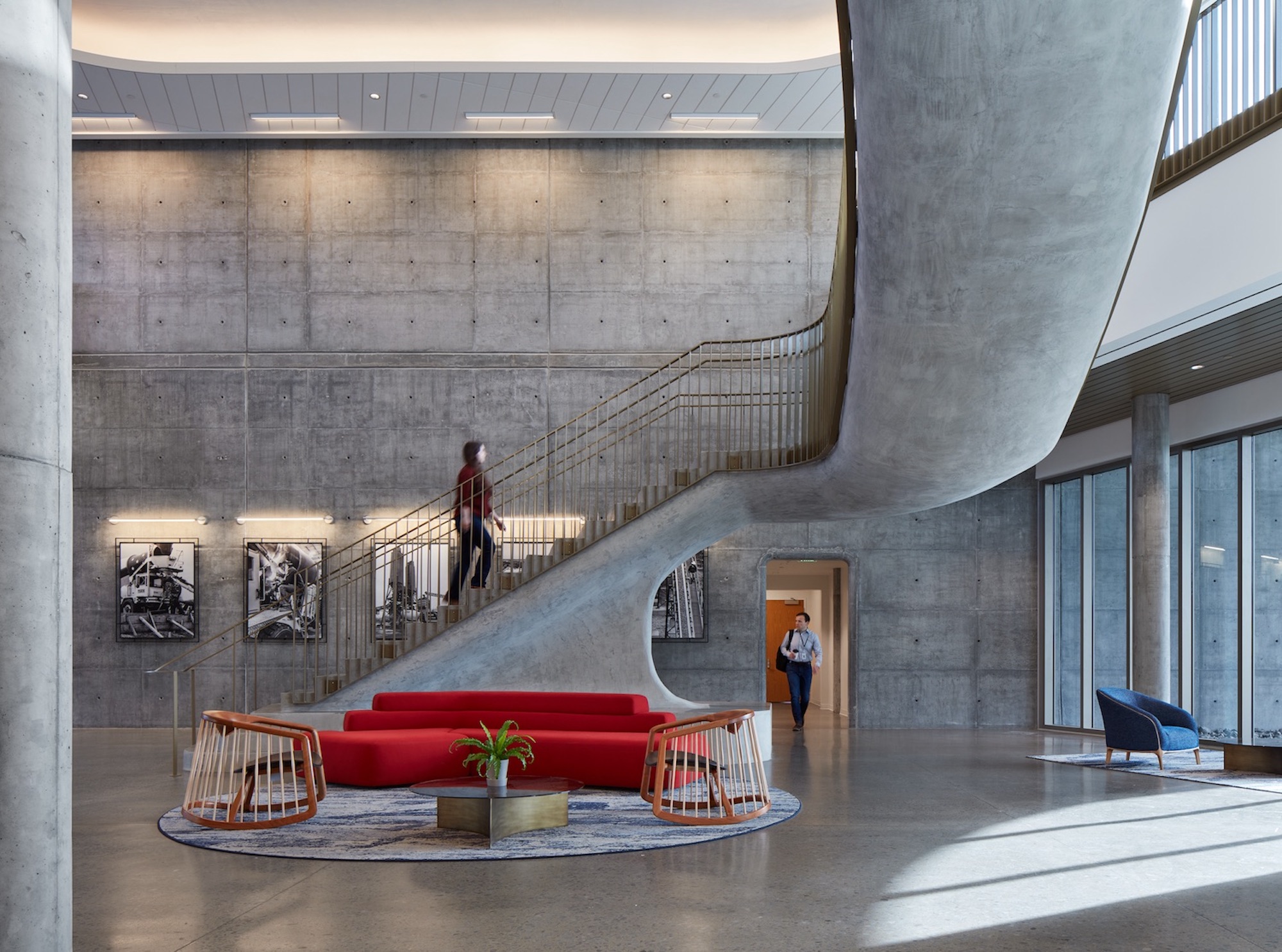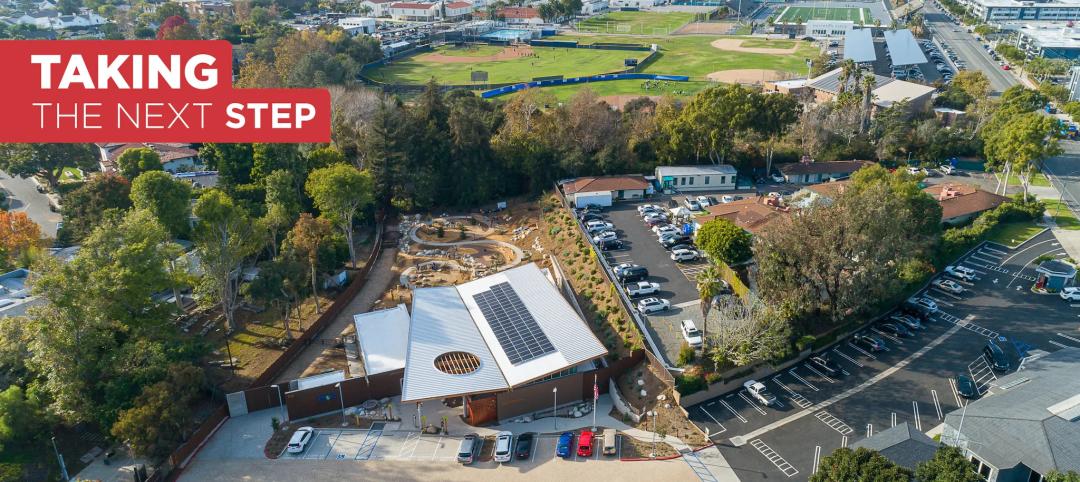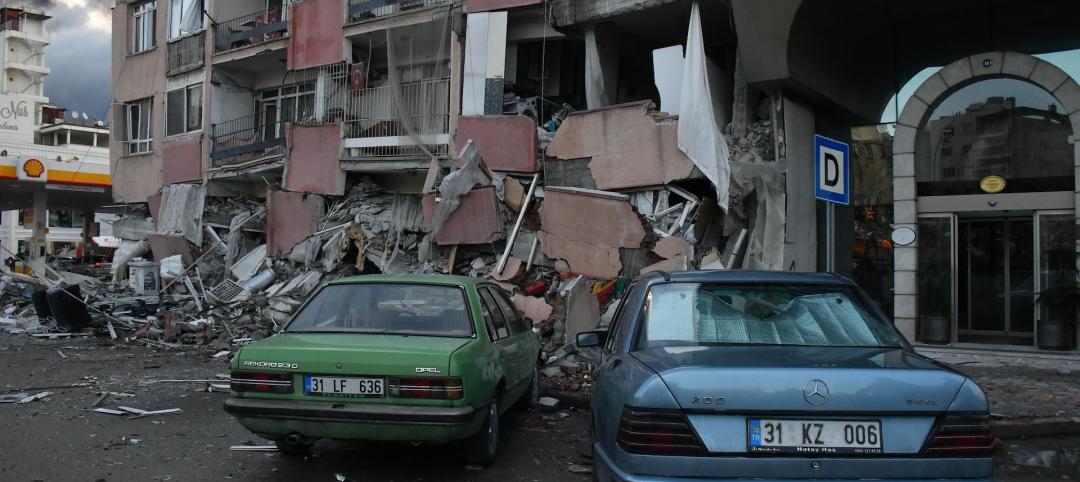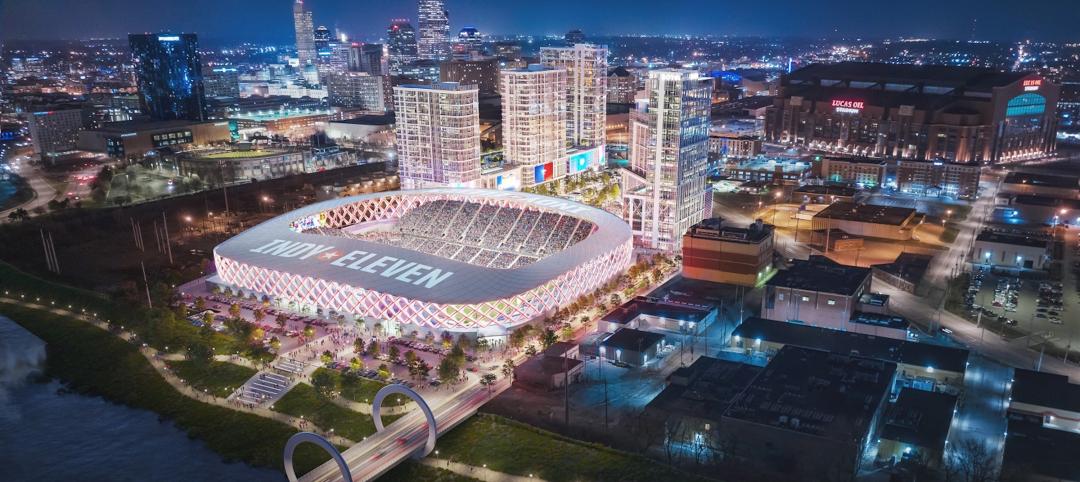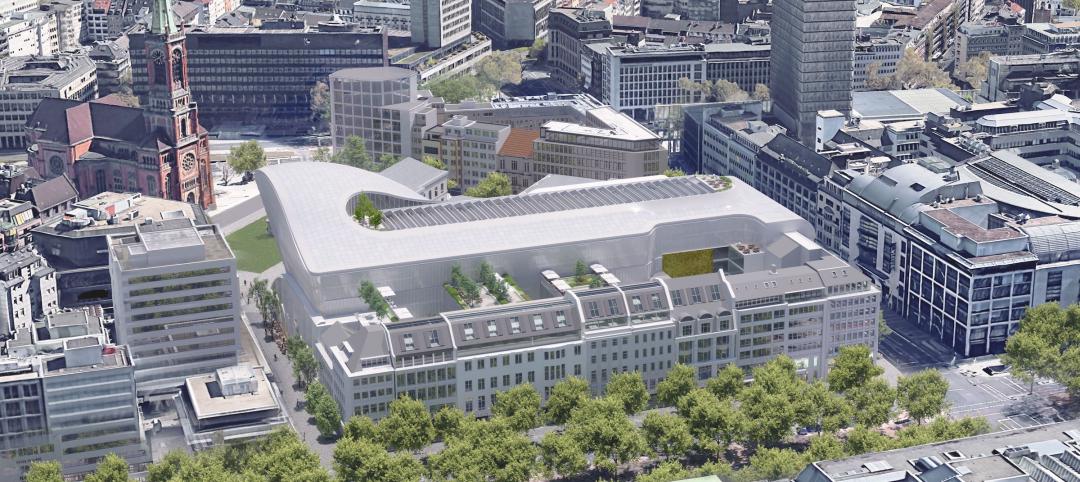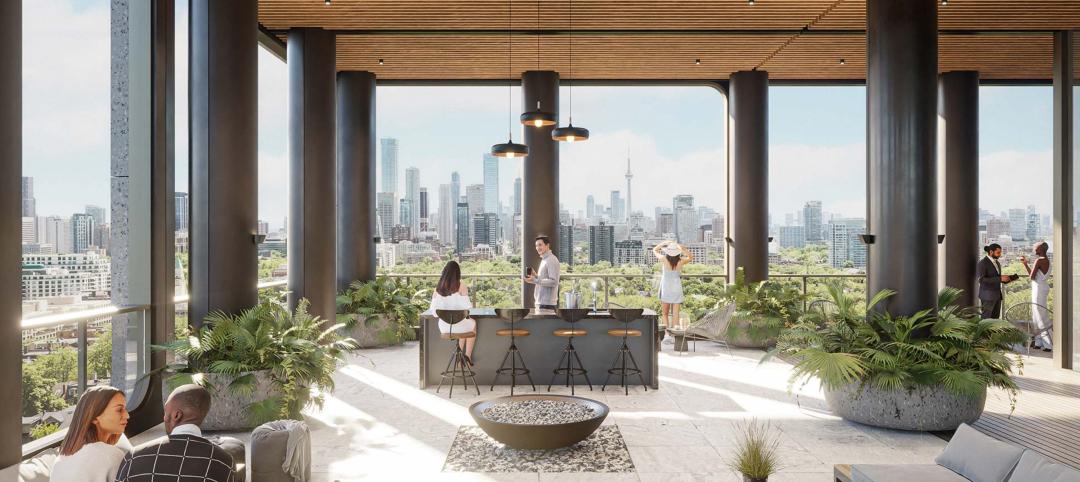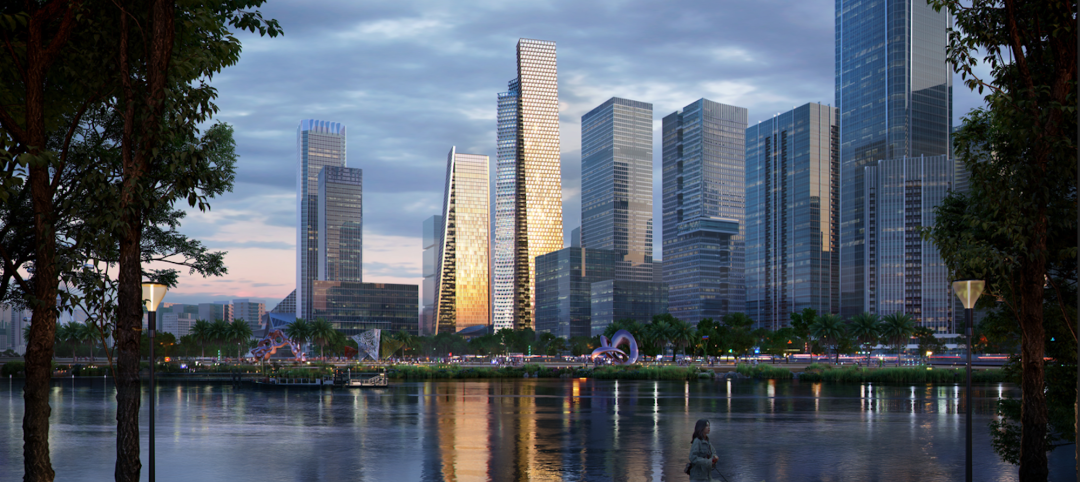In 1999, Tennessee concrete company Smyrna Ready Mix started off with just three trucks. Since then, it has grown to 5,400 employees in 16 states. Last year, the company moved from its small office in downtown Nashville to its new corporate headquarters on an 800-acre site.
Designed by EOA Architects to showcase various concrete processes and applications, the five-story, 85,000-sf building’s vertical layering mimics the patterns in the company’s stone quarry, located on the opposite end of the campus site. The building’s glass and concrete bands are meant to mirror the quarry’s natural contours and striations.
Inside, the helix of the building’s circulation patterns draws inspiration from the shape of a concrete mixing truck drum. Exposed concrete walls extend unobstructed from the first through fifth floors. The shear wall, the elevator, and the stair cores are 18-inch-thick poured walls with a custom radius, minimizing the amount of finishing work needed post-pour.
The interior design also references the company’s brand and industry. Custom-designed light fixtures echo the forms of concrete drums. The steps’ curved underside nods to the supply chutes used to pour concrete from the mixing drum. In the training room, the wet bar’s backsplash has been made with repurposed test cylinders, which are used to determine the strength of a mixed concrete batch. Furniture and textiles incorporate the red, white, and blue colors of the company’s logo.
The project also features corporate amenities for onsite staff and drivers, including dining, a fitness facility, training and community rooms, and a daycare center for 100 of the company and community’s children. Future plans for the campus include walking paths.
On the Building Team:
Owner: SRM Concrete
Design architect: EOA Architects
Architect of record: EOA Architects
MEP engineer: I.C. Thomasson Associates
Structural engineer: EMC Structural Engineers
General contractor/construction manager: DPR Construction
Here is the design statement from EOA Architects:
Smyrna Ready Mix is a family-owned and operated concrete company founded in Smyrna, Tennessee in 1999. Beginning with only three trucks, the company has grown to 5,400 employees in 16 states. This dramatic expansion meant it was time to move from a cramped office in downtown Nashville to a new corporate headquarters on an 800-acre site near an interstate interchange just south of the city. Here, the new building will help anchor a new mixed-use development, provide a landmark for a new corporate campus and help definite this gateway to the town of Smyrna.
Office Building as Billboard
Designed to showcase the varied types of concrete processes and applications, the vertical layering of the five-story building mimics the rhythms found in the company’s stone quarry, also located on the site. The building profile rises at the opposite end the site from the sunken quarry, creating an inverse relationship that guides the design. The building’s floor plate pushes and pulls to create an organic form with glass and concrete bands mirroring the quarry’s natural contours and striations.
Full glazing takes advantage of surrounding views and showcases the structural components, including numerous types of concrete and finishing styles. Slender 16-inch diameter columns made of a high-strength concrete mix balance on elegant bases tapered to 10 inches at the first floor and do the work of a typical 24-inch column. Cantilevered post-tension slabs demonstrate the material’s sculptural possibilities. The building contains no 90-degree edges; everything is rounded, creating a dynamic flow that further reinforces concrete’s versatility.
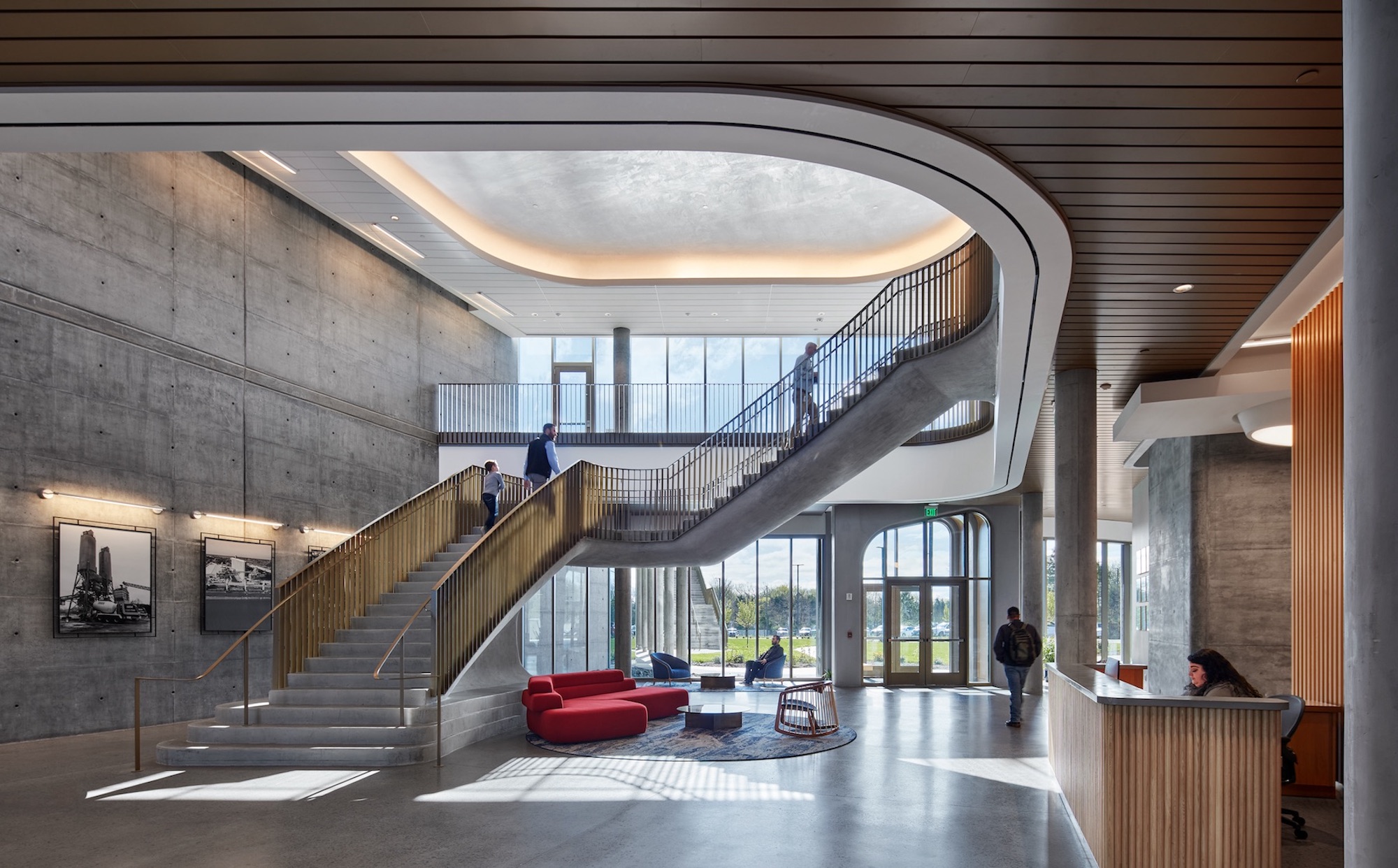
Workplace design uses lightness, movement
EOA steered away from a brutalist concrete expression to emphasize light and lightness and create a warm and welcoming environment. Users enter the building through three large concrete fins that provide the framework for the entry vestibules. The lobby floor is a custom concrete mix developed by EOA and SRM that resembles terrazzo. The lobby’s material palate adds a vertical oak motif complemented by champagne colored metal ceilings and railings. A double cantilevered concrete stair anchored in front of the exposed double-height concrete shear wall cascades gracefully into the lobby space, establishing the sense of open movement that permeates the building.
Inspired by the shape of a concrete mixing truck drum, the design incorporates an internal helix into the building’s circulation patterns. Vertical circulation is highlighted through the use of exposed concrete walls that extend unobstructed from the first through fifth floors. The shear wall, as well as the elevator and stair cores are 18-inch-thick poured walls with a custom radius to soften the edges and minimize the amount of finishing work required post-pour. These elements were left in a natural sculptural state with only a matte finish sealer applied to allow the form-work joints to cast shadows as sunlight moves through the space.
Artful connections to the company's brand and industry infuse the interiors: Custom designed light fixtures echo the forms of concrete drums. The curved underside of the monumental steps is a nod to the supply chutes used to pour concrete from the mixing drum. In the training room, test cylinders, used to determine the strength of each mixed concrete batch, were cut and re-purposed as the backsplash of the training room wet bar. Furniture and textiles subtly incorporate the red, white and blue colors of the company's logo.
Office building supports family business, community vision
The family had a specific and progressive vision for its new home. It was important to them to invite the community into the building and onto the campus, which includes a historic community cemetery. Future plans include walking paths to create a larger, healthy holistic environment. The project also prioritized unprecedented corporate amenities for both on-site staff as well as drivers: the first floor includes on-site dining, a fitness facility, training and community rooms as well as a daycare center for 100 of the company and community’s children.
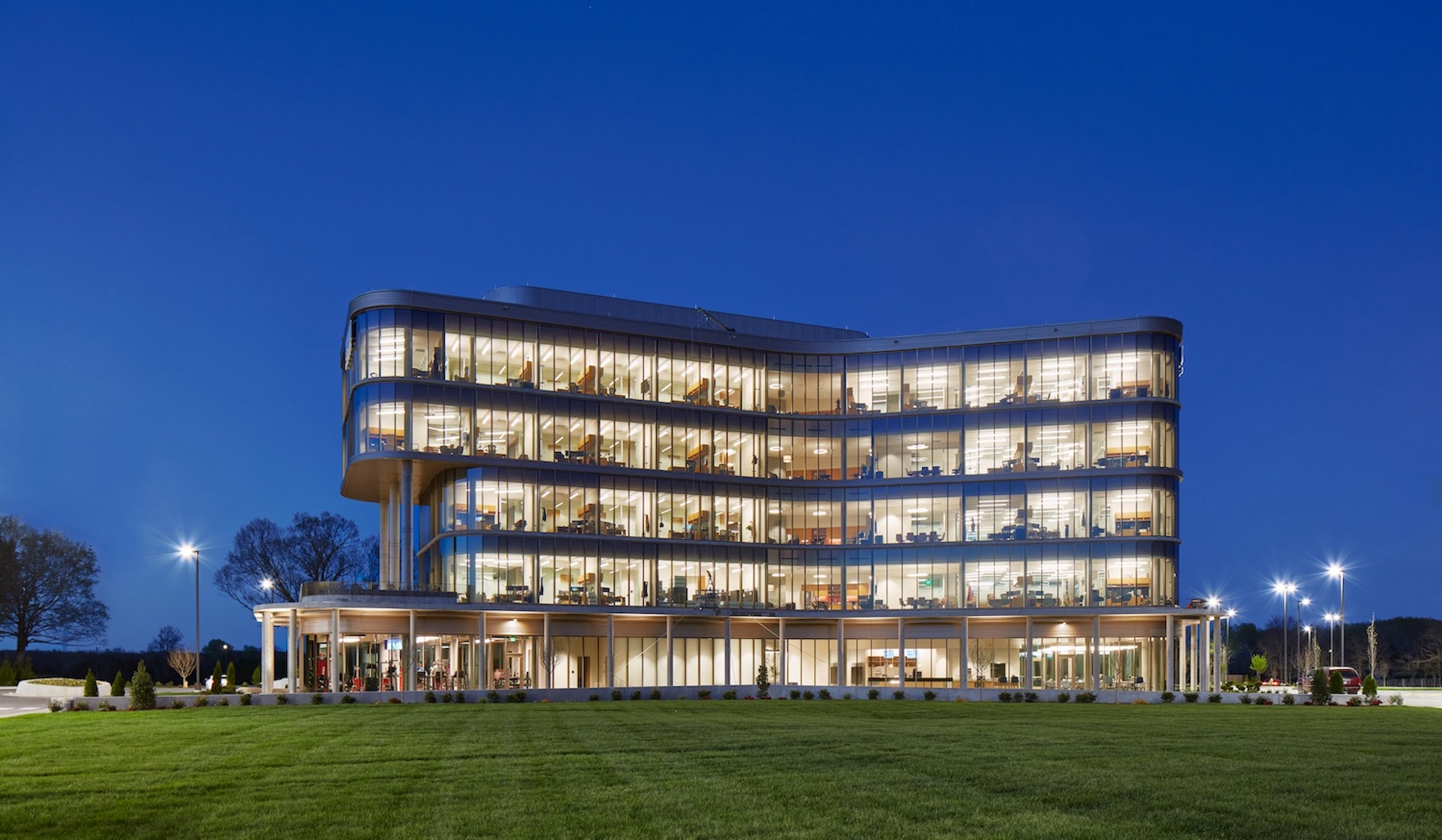
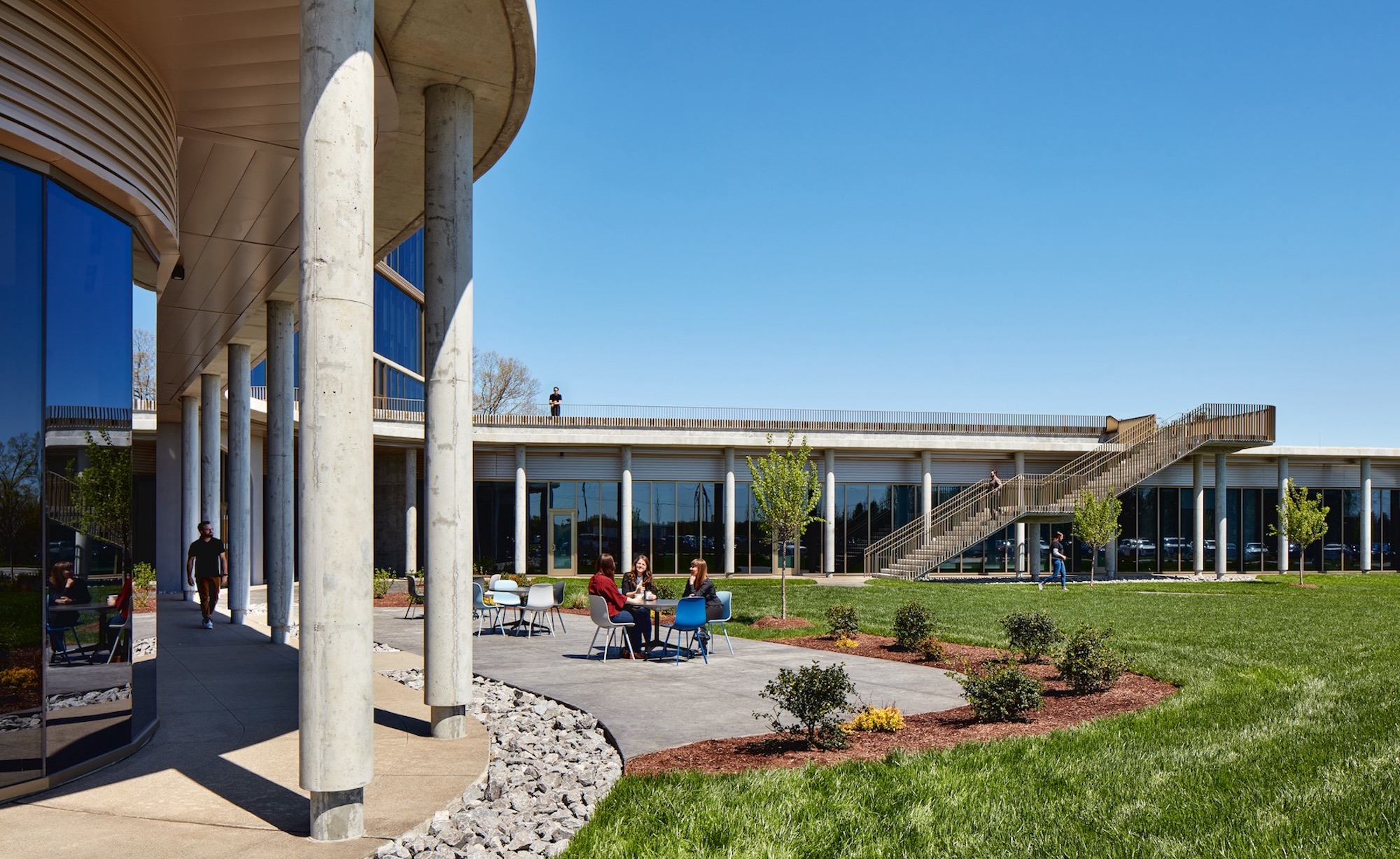
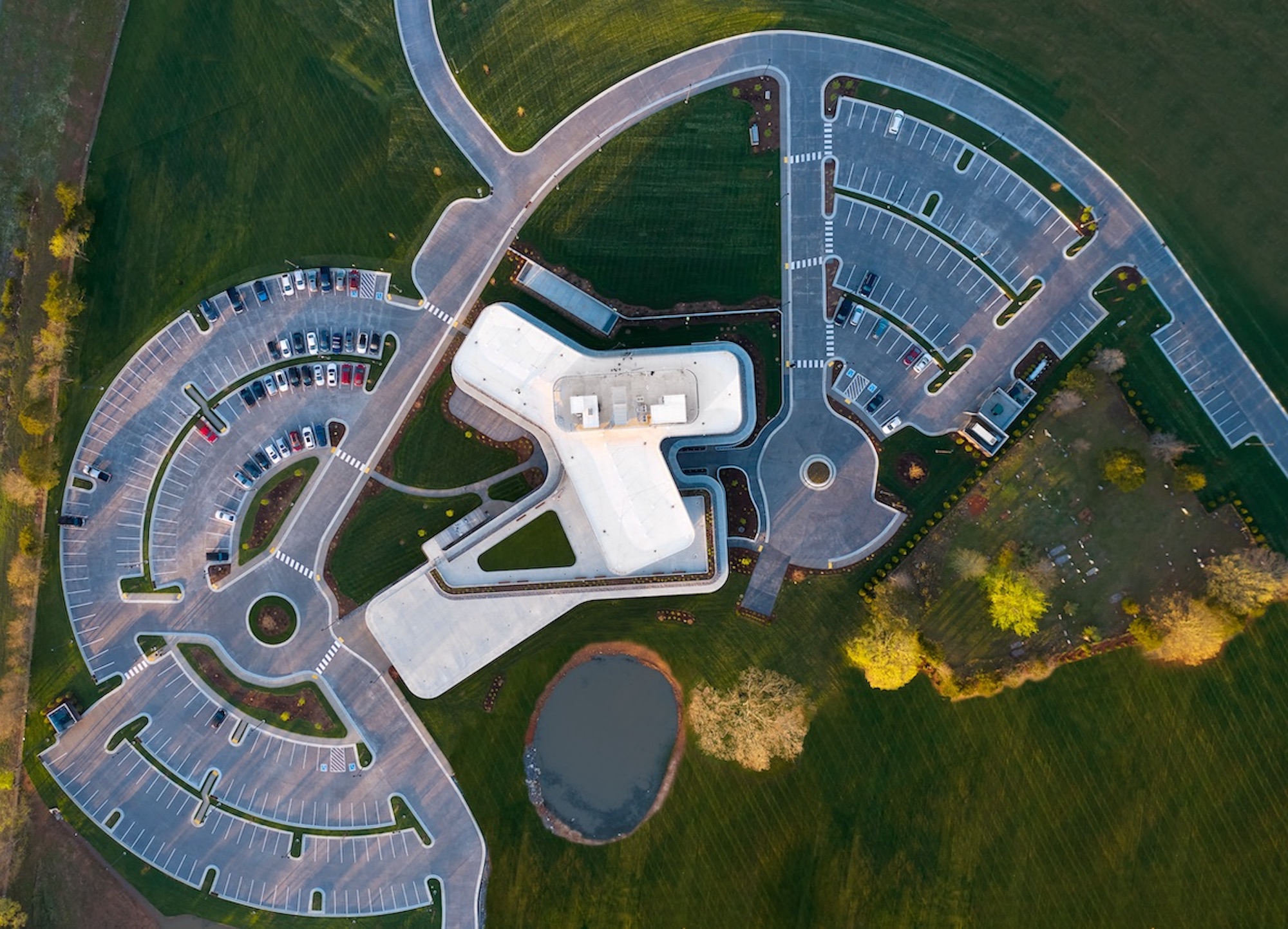
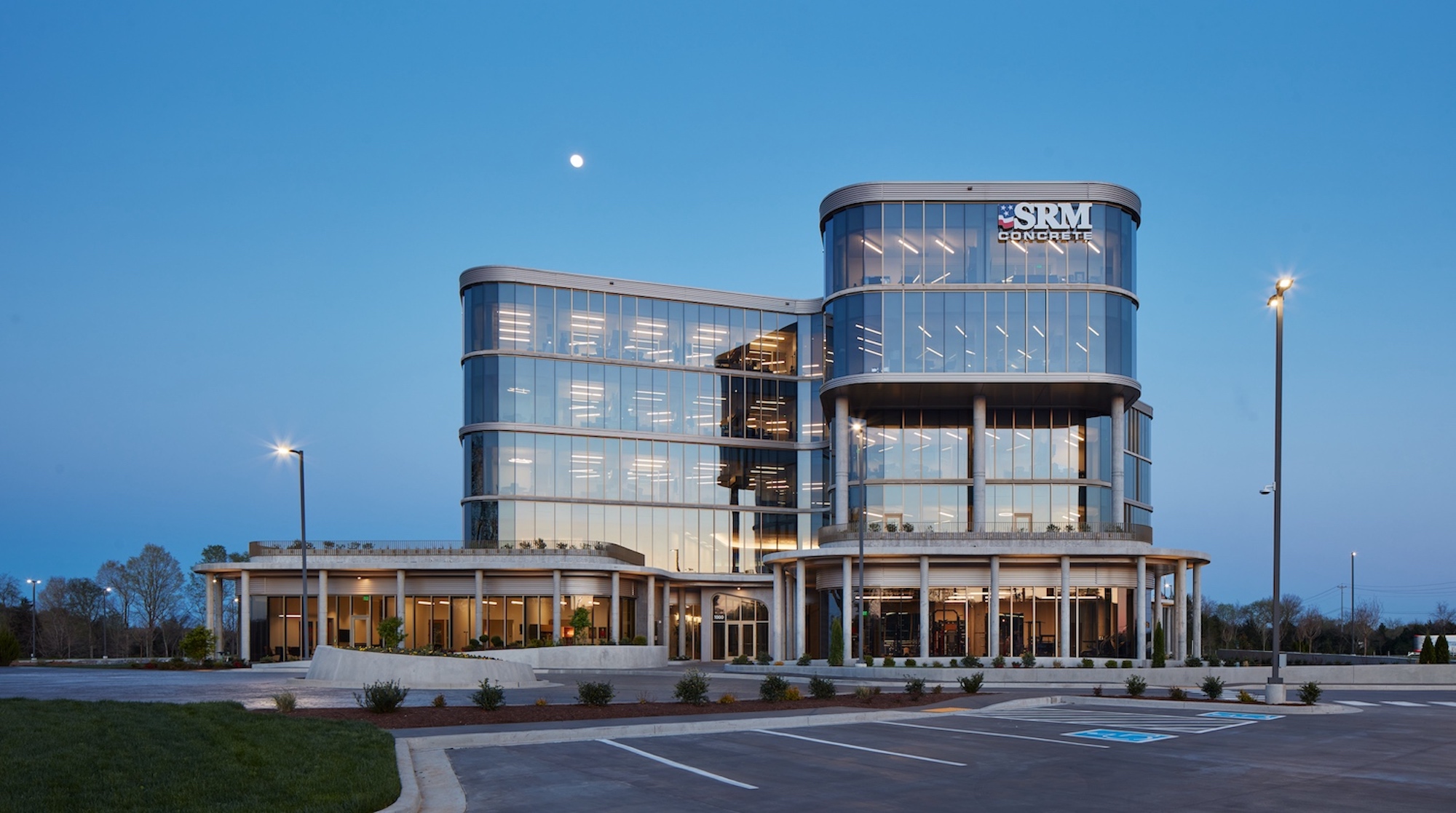
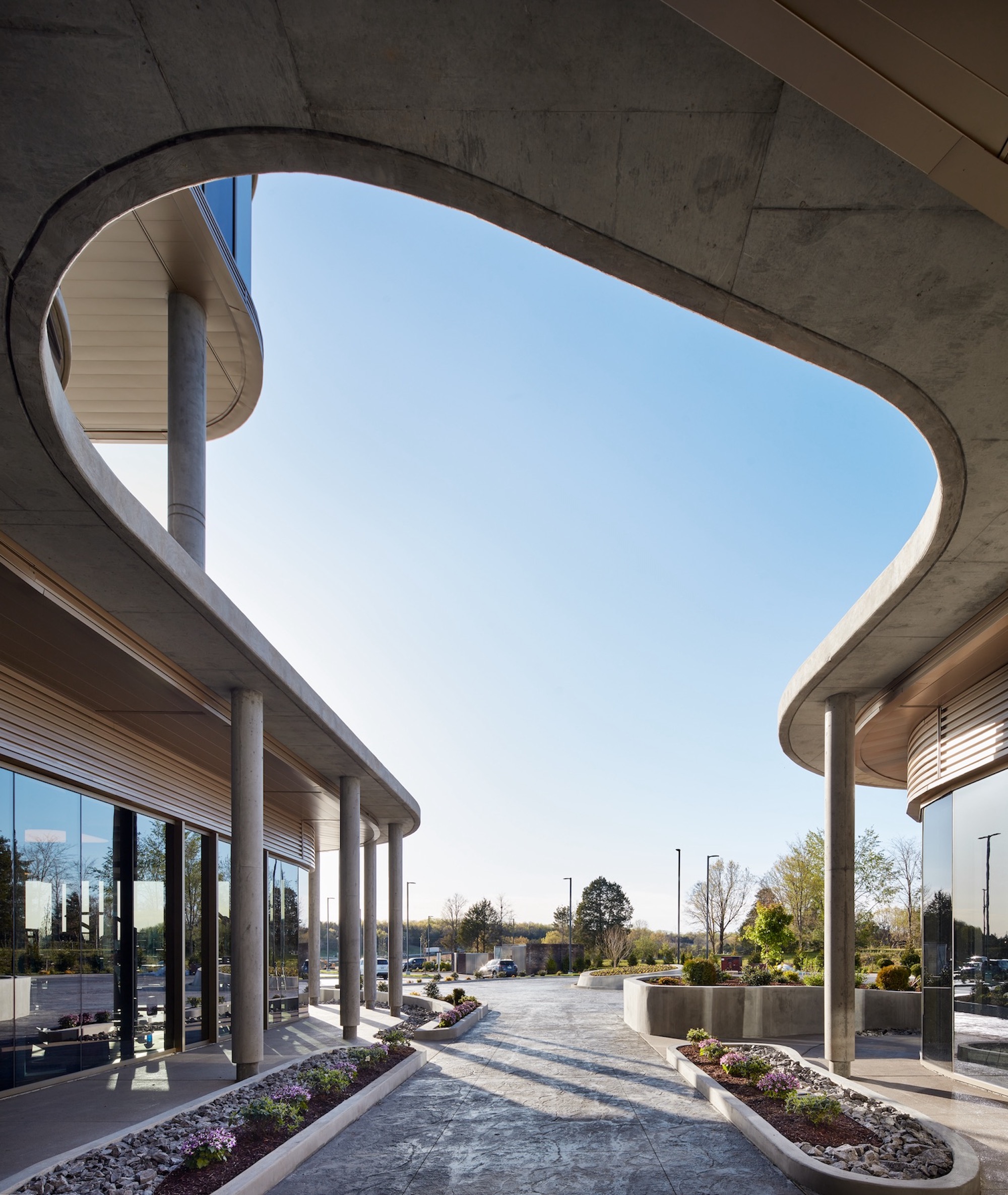
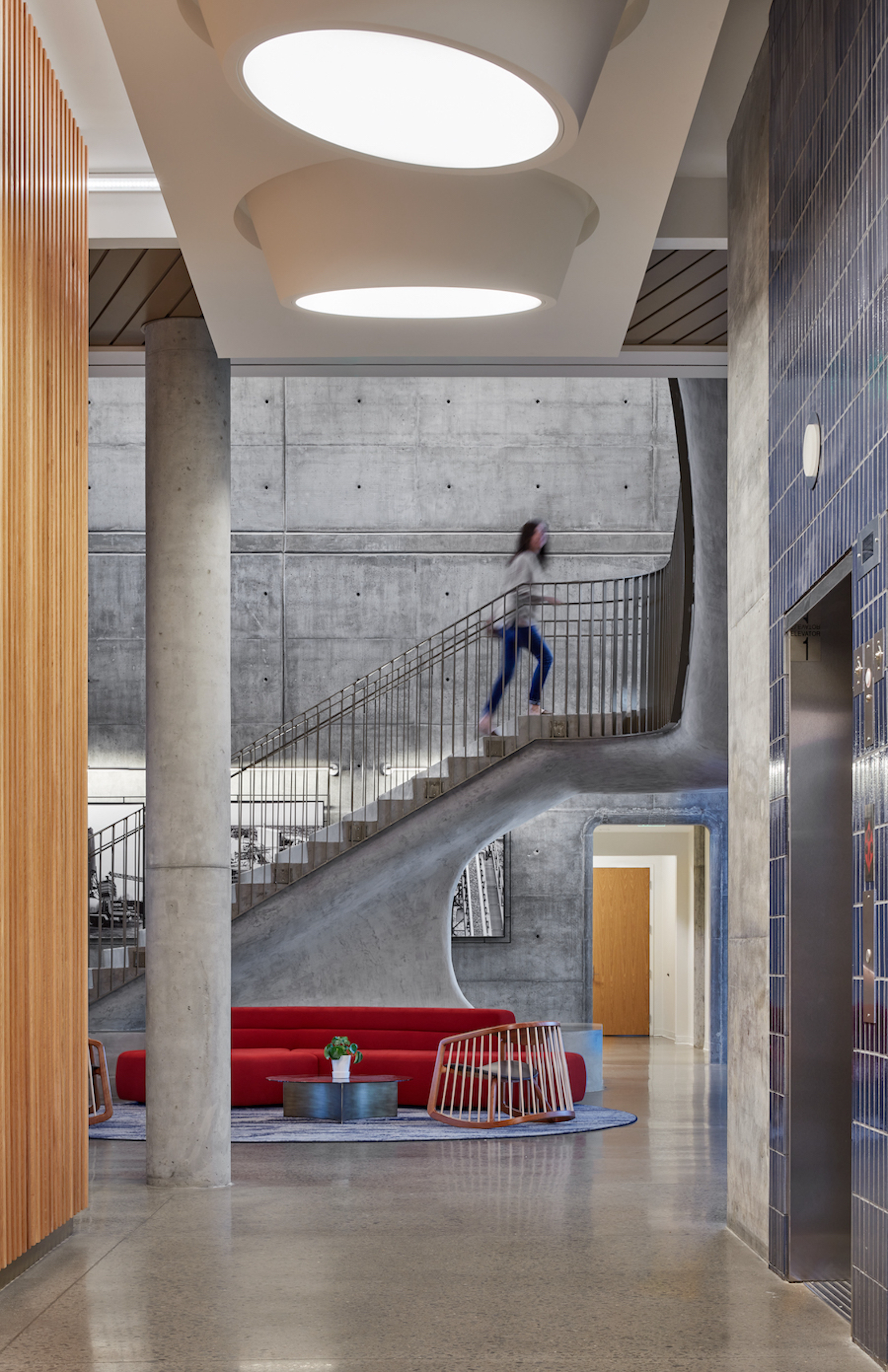
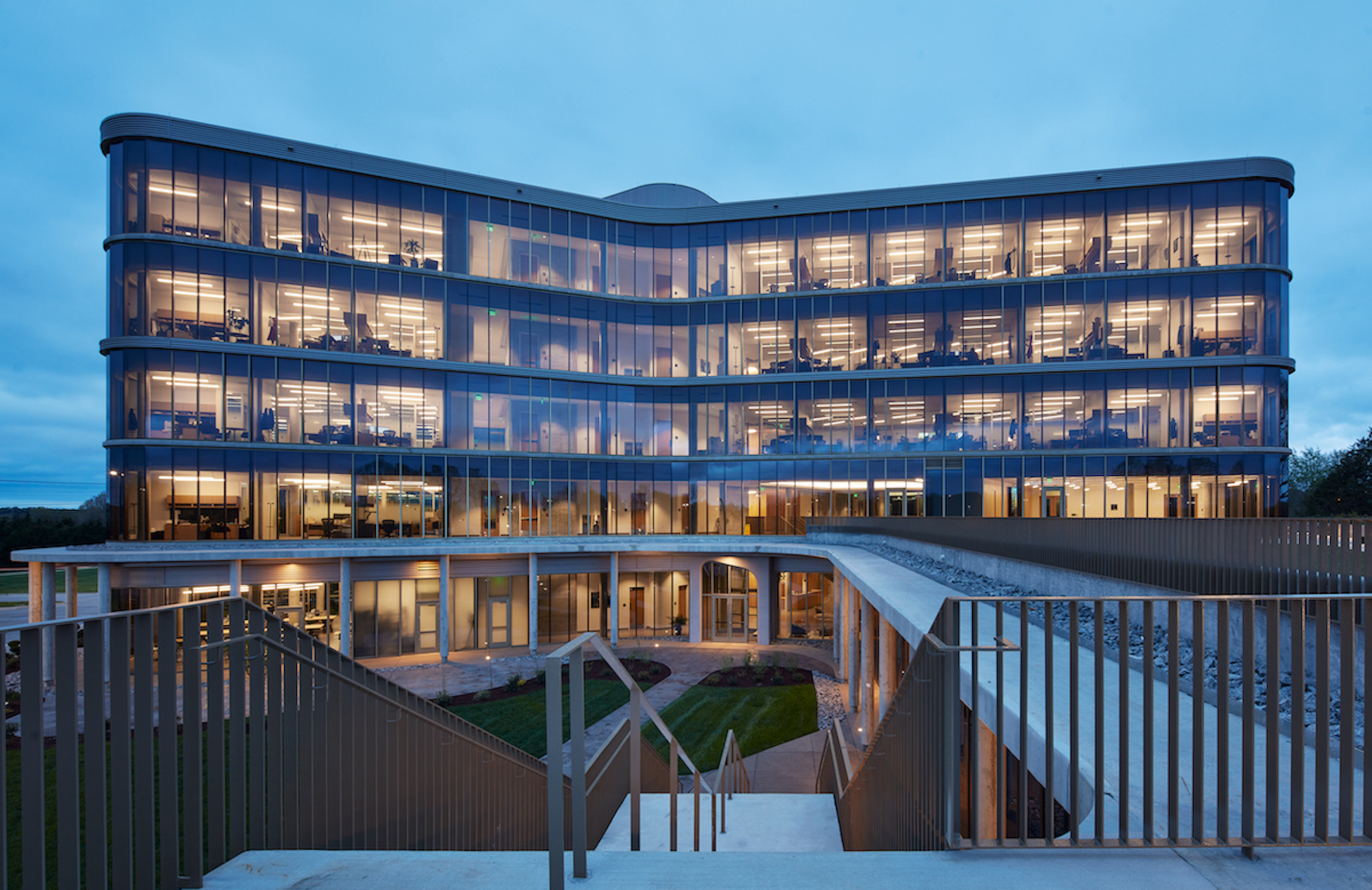
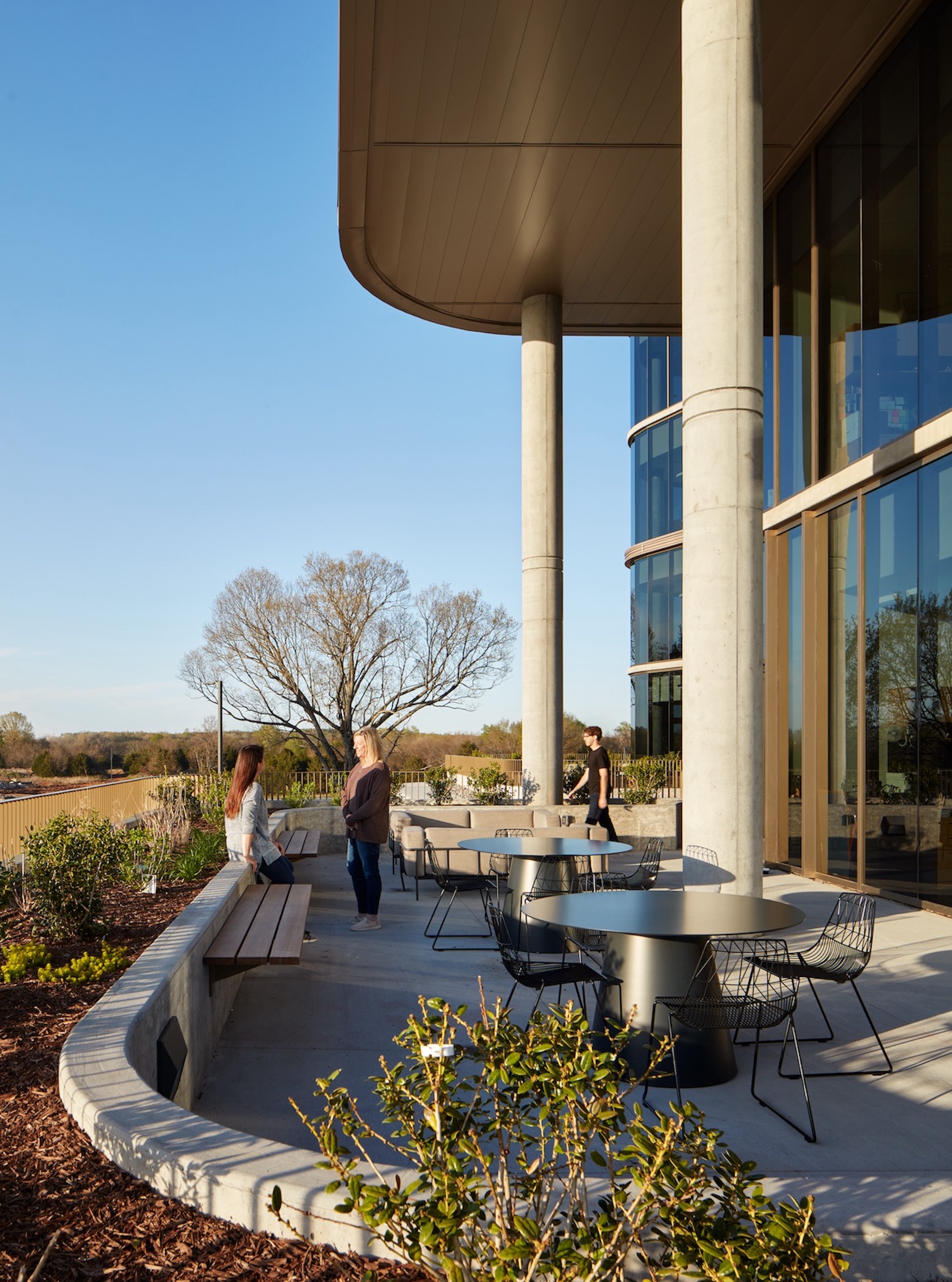
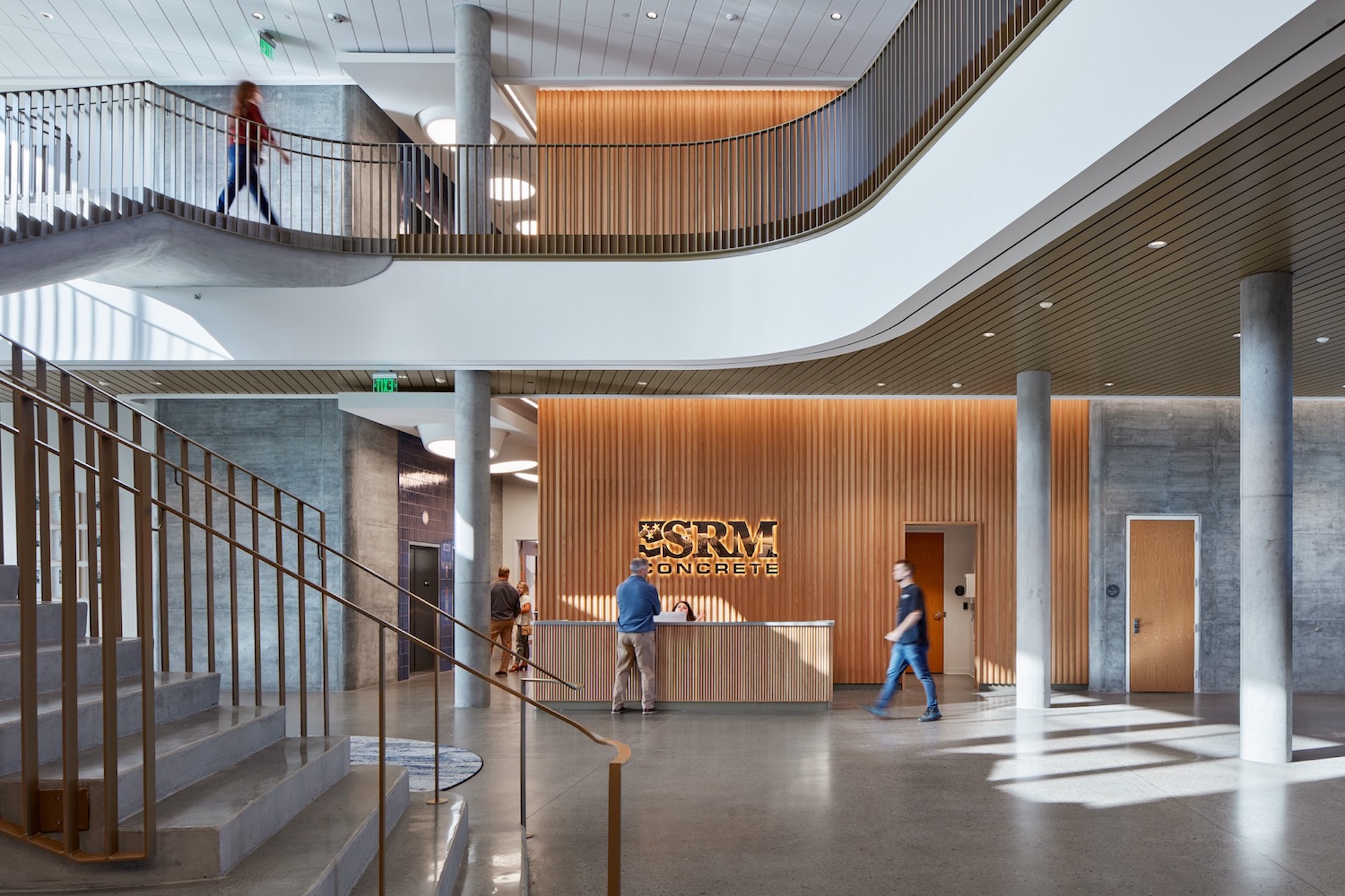
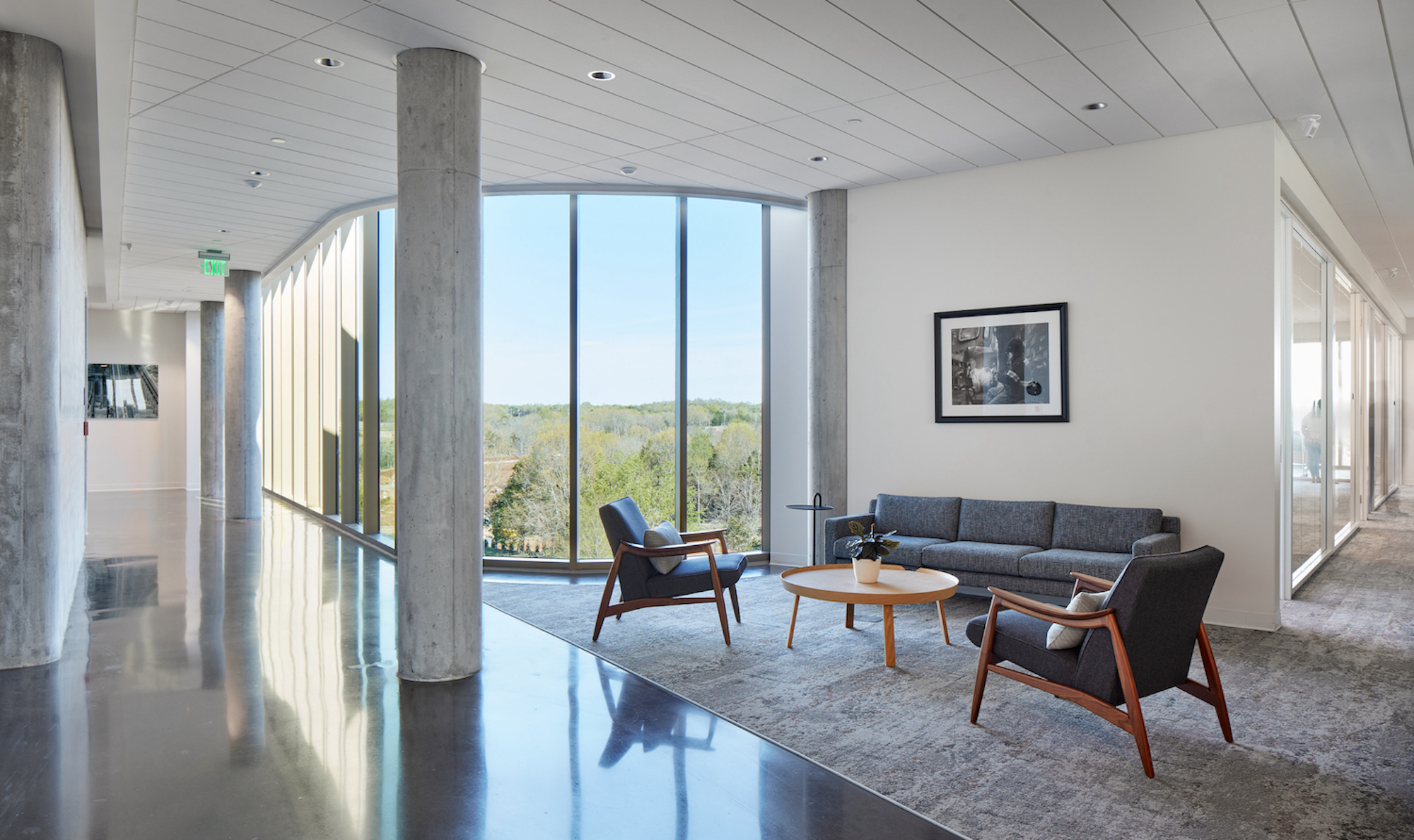
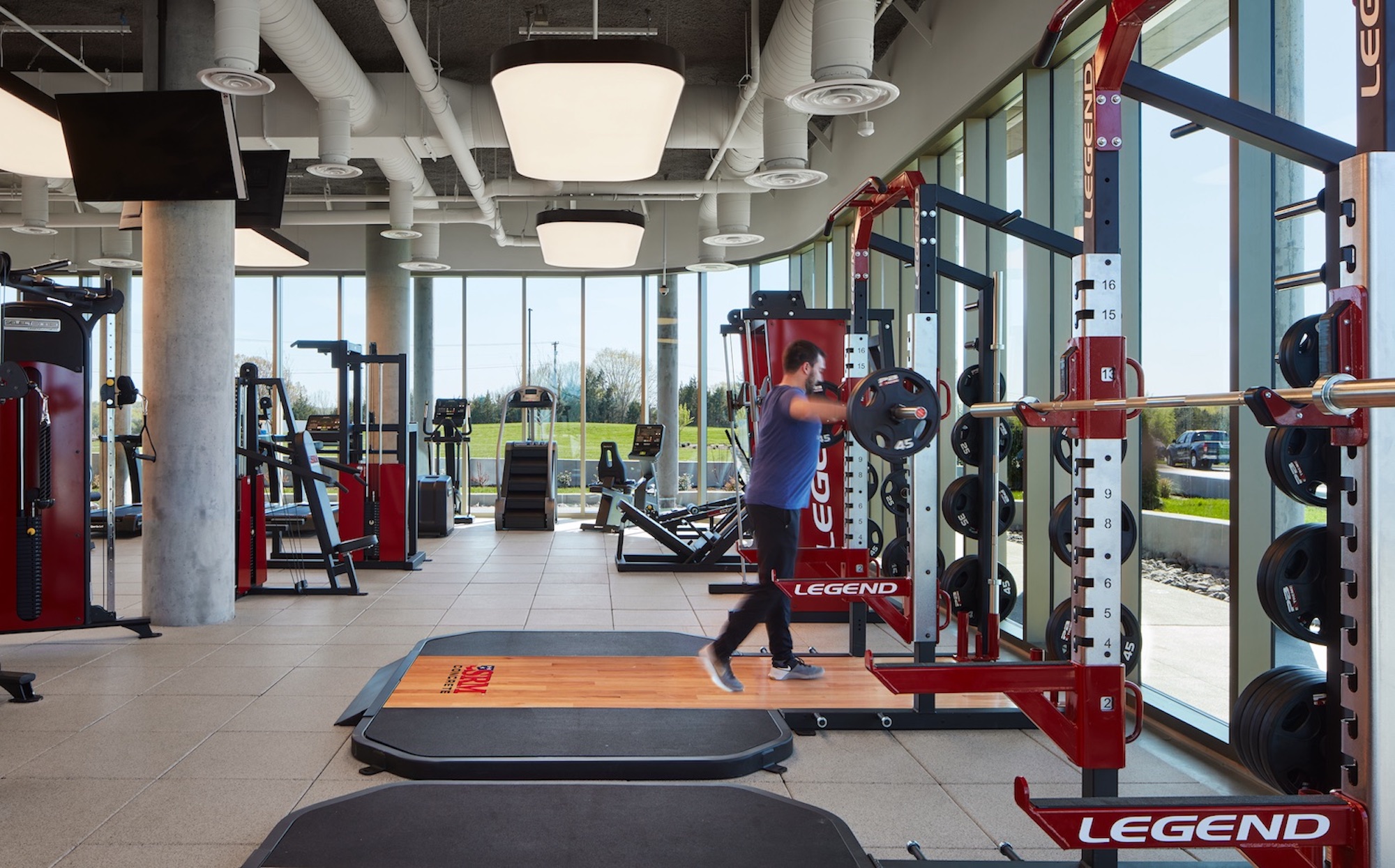
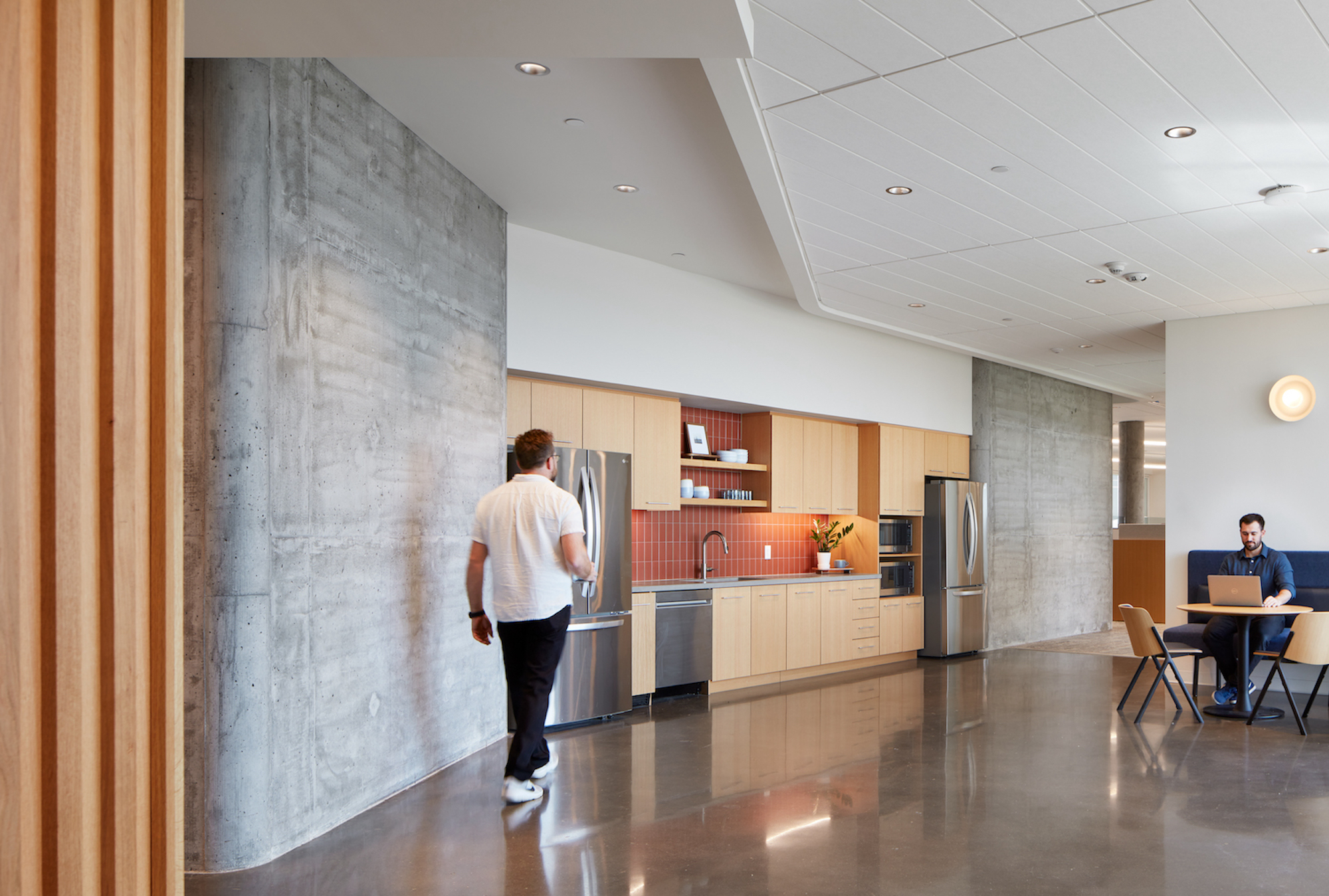
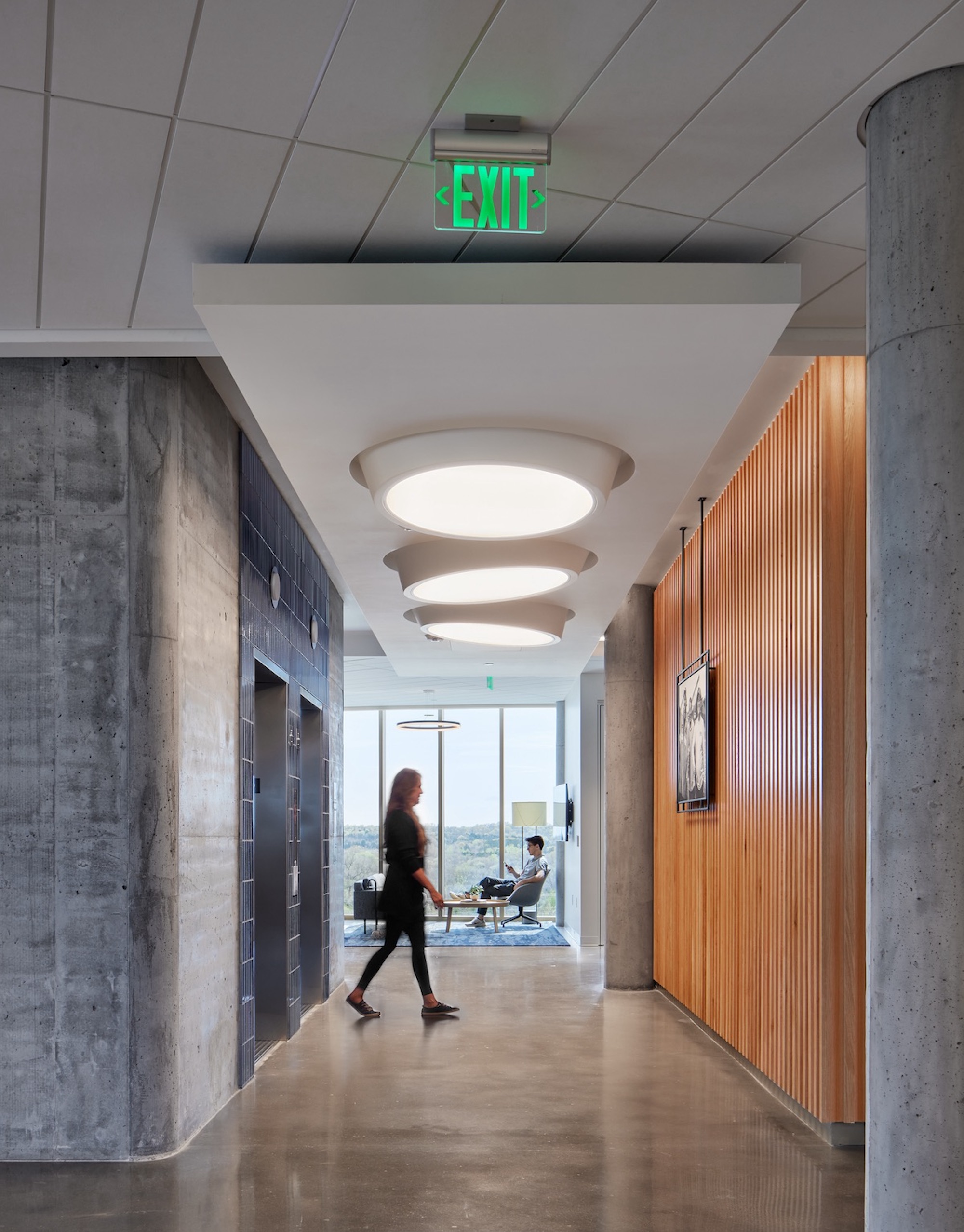
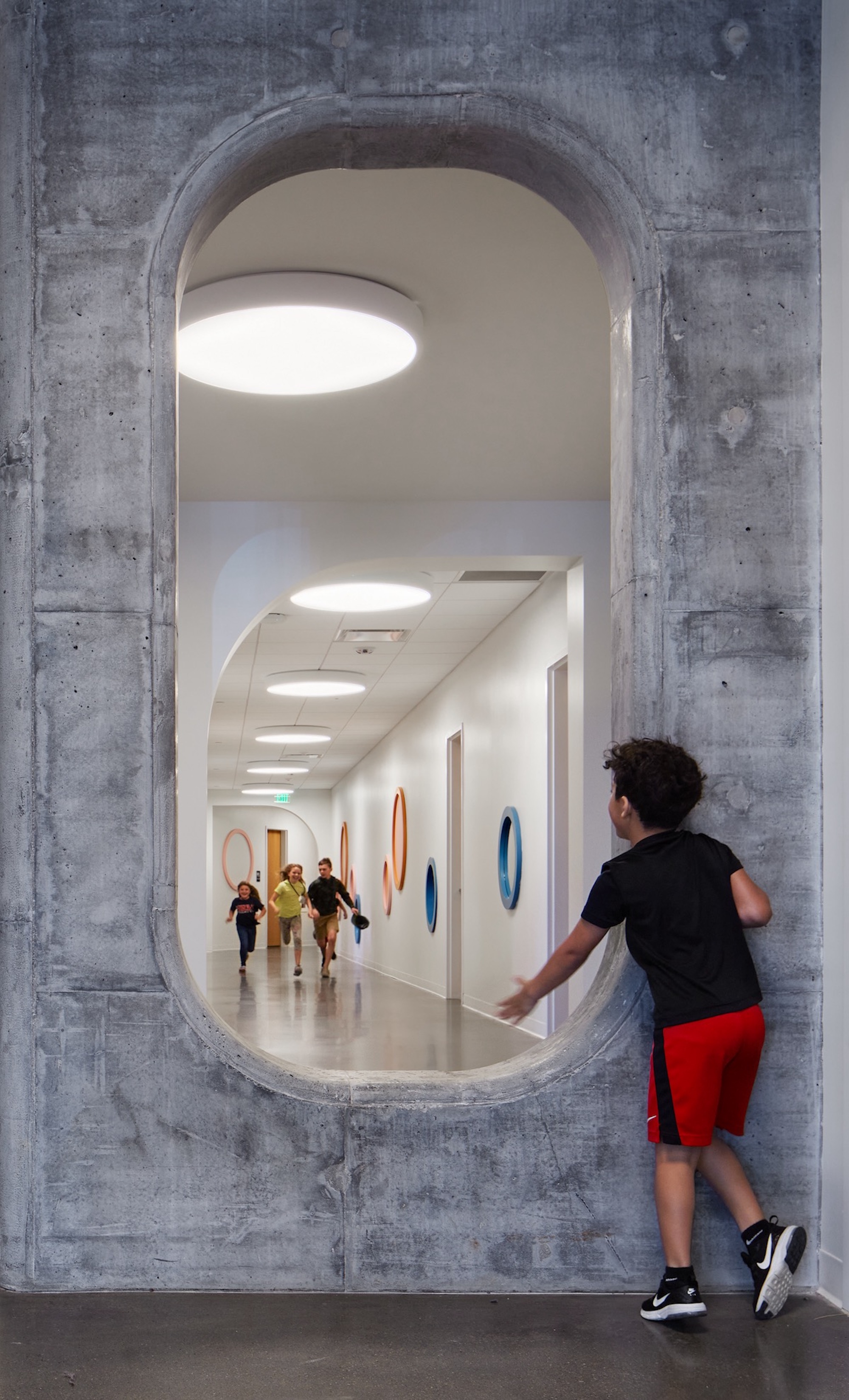
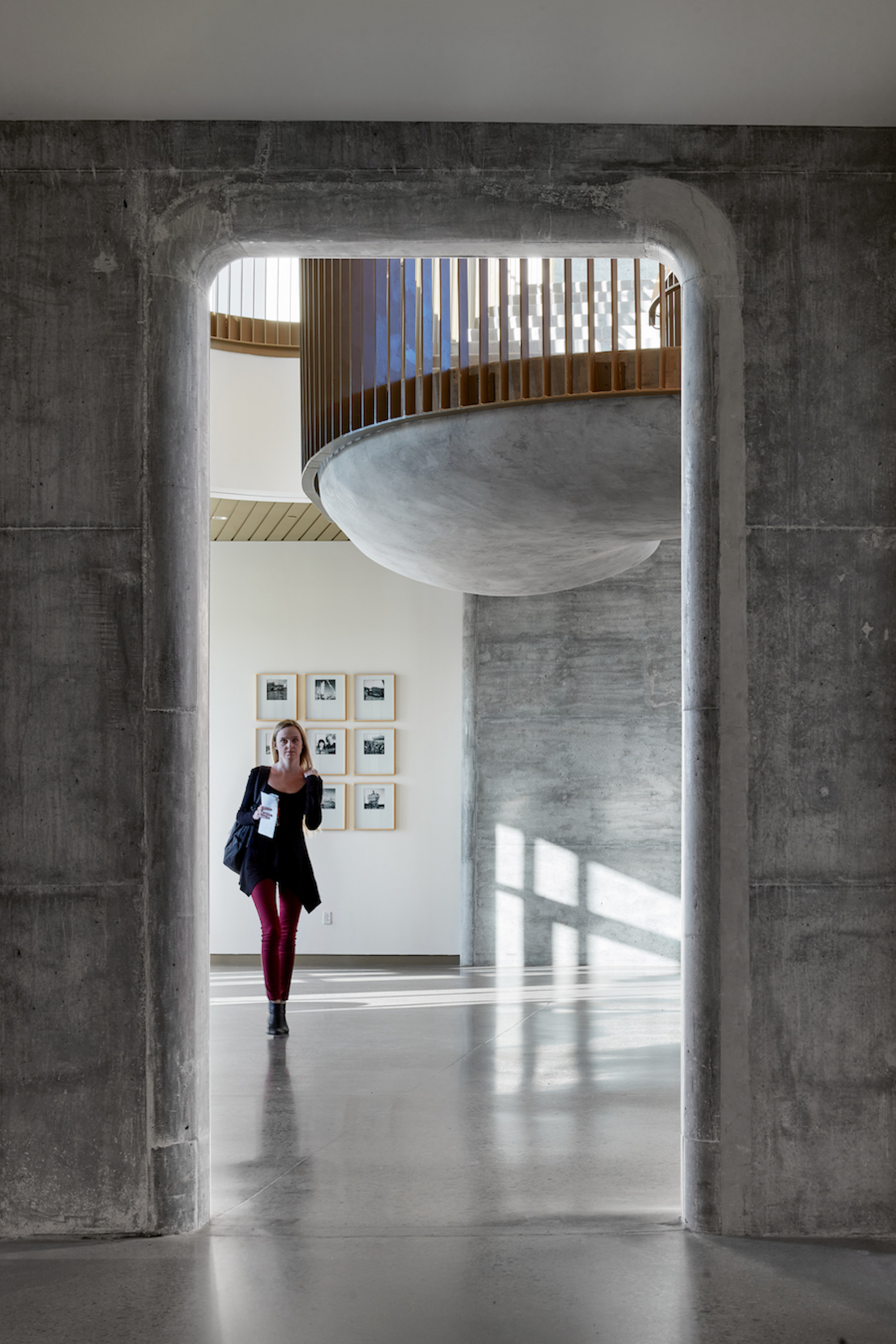
Related Stories
Mixed-Use | Mar 11, 2023
Austin mixed-use development will provide two million sf of office, retail, and residential space
In Austin, Texas, the seven-building East Riverside Gateway complex will provide a mixed-use community next to the city’s planned Blue Line light rail, which will connect the Austin Bergstrom International Airport with downtown Austin. Planned and designed by Steinberg Hart, the development will include over 2 million sf of office, retail, and residential space, as well as amenities, such as a large park, that are intended to draw tech workers and young families.
Architects | Mar 8, 2023
Is Zoom zapping your zip? Here are two strategies to help creative teams do their best work
Collaborating virtually requires a person to filter out the periphery of their field of vision and focus on the glow of the screen. Zoom fatigue is a well-documented result of our over-reliance on one method of communication to work. We need time for focus work but working in isolation limits creative outcomes and innovations that come from in-person collaboration, write GBBN's Eric Puryear, AIA, and Mandy Woltjer.
Green Renovation | Mar 5, 2023
Dept. of Energy offers $22 million for energy efficiency and building electrification upgrades
The Buildings Upgrade Prize (Buildings UP) sponsored by the U.S. Department of Energy is offering more than $22 million in cash prizes and technical assistance to teams across America. Prize recipients will be selected based on their ideas to accelerate widespread, equitable energy efficiency and building electrification upgrades.
Sustainability | Mar 2, 2023
The next steps for a sustainable, decarbonized future
For building owners and developers, the push to net zero energy and carbon neutrality is no longer an academic discussion.
Industry Research | Mar 2, 2023
Watch: Findings from Gensler's latest workplace survey of 2,000 office workers
Gensler's Janet Pogue McLaurin discusses the findings in the firm's 2022 Workplace Survey, based on responses from more than 2,000 workers in 10 industry sectors.
Seismic Design | Feb 27, 2023
Turkey earthquakes provide lessons for California
Two recent deadly earthquakes in Turkey and Syria offer lessons regarding construction practices and codes for California. Lax building standards were blamed for much of the devastation, including well over 35,000 dead and countless building collapses.
Sports and Recreational Facilities | Feb 27, 2023
New 20,000-seat soccer stadium will anchor neighborhood development in Indianapolis
A new 20,000-seat soccer stadium for United Soccer League’s Indy Eleven will be the centerpiece of a major neighborhood development in Indianapolis. The development will transform the southwest quadrant of downtown Indianapolis by adding more than 600 apartments, 205,000 sf of office space, 197,000 sf for retail space and restaurants, parking garages, a hotel, and public plazas with green space.
Retail Centers | Feb 24, 2023
Santiago Calatrava unveils plans for a luxury retail and office complex in Düsseldorf, Germany
Renowned architect and engineer Santiago Calatrava, along with the CENTRUM Group, has unveiled plans for Calatrava Boulevard, a luxury retail and office complex in Düsseldorf, Germany. Running parallel to Königsallee and connecting with the Steinstrasse station, Calatrava Boulevard will incorporate and connect to the boulevard’s existing buildings.
Reconstruction & Renovation | Feb 16, 2023
Insights from over 300 potential office-to-residential conversions
Research from Gensler finds that, surprisingly, the features that result in an unpleasant office often make for a superlative multifamily product.
High-rise Construction | Feb 15, 2023
Bjarke Ingels' 'leaning towers' concept wins Qianhai Prisma Towers design competition
A pair of sloped high-rises—a 300-meter residential tower and a 250-meter office tower—highlight the Qianhai Prisma Towers development in Qianhai, Shenzhen, China. BIG recently won the design competition for the project.


